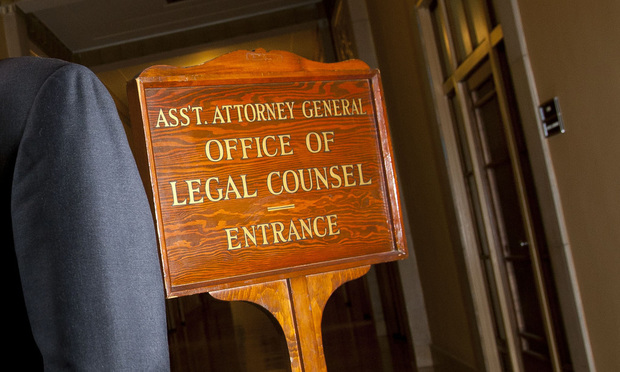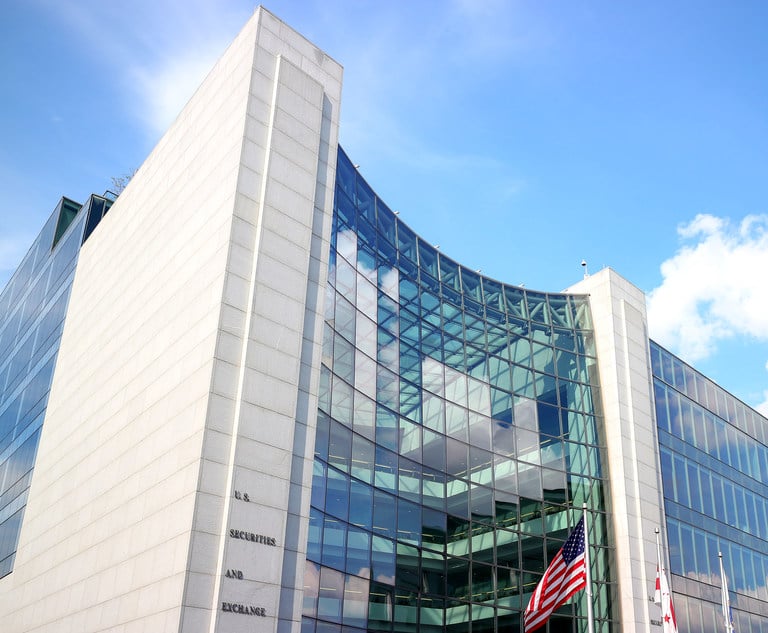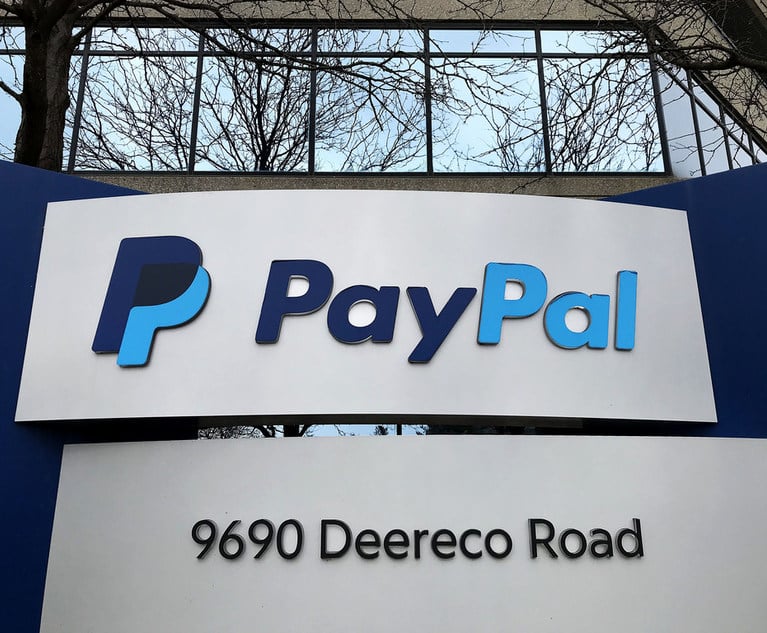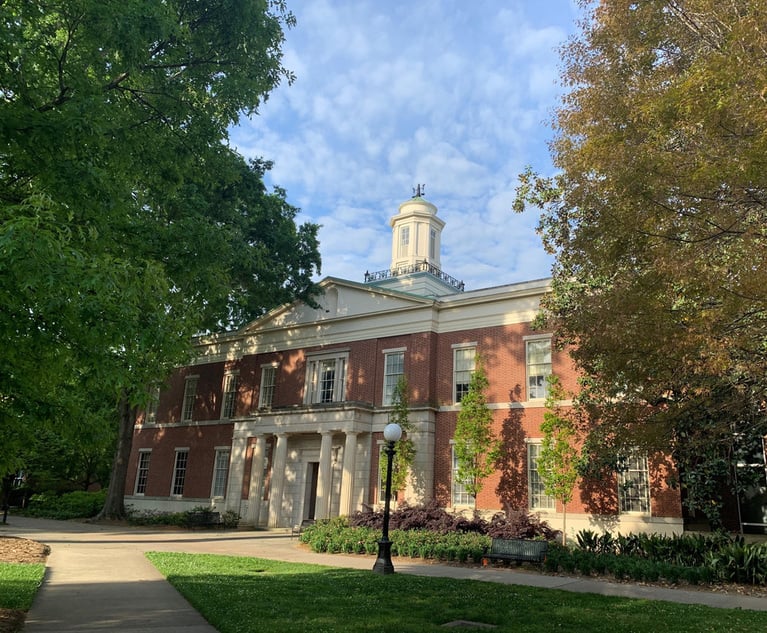'The Court is Not Persuaded': 2 Judges Question OLC's Policy Against Indicting a Sitting President
The judges noted that the courts have yet to weigh in on whether a sitting president can be indicted.
October 11, 2019 at 01:34 PM
6 minute read
The original version of this story was published on National Law Journal
 Photo: Diego M. Radzinschi/ALM
Photo: Diego M. Radzinschi/ALM
A pair of federal judges this week raised questions about the Department of Justice's stance that a sitting president can't be indicted.
The position, first outlined in a 1973 Office of Legal Counsel memo, was spotlighted when then-special counsel Robert Mueller said earlier this year that he did not make a traditional charging decision for President Donald Trump because of the guidance. He said it would be "unfair" to potentially accuse the president of criminal conduct "when there could be no court resolution of the actual charge."
But the issue came up again in an opinion from U.S. District Judge Victor Marrero in the Southern District of New York on Monday, as he tossed out a lawsuit from Trump challenging the Manhattan district attorney's subpoena for his tax returns.
"The Court is not persuaded that it should accord the weight and legal force the President ascribes to the DOJ Memos, or accept as controlling the far-reaching proposition for which they are cited in the context of the controversy at hand," Marrero wrote, noting that the concept that a sitting president can't be indicted is generally linked back to the memos as the "sole authority for that proposition."
He said the U.S. Supreme Court has never ruled on whether a president can be subject to the level of immunity that Trump claimed his office offers to him and that the memos "do not constitute authoritative judicial interpretation of the Constitution concerning those issues."
Marrero wrote that he believes "better-calibrated alternatives to absolute presidential immunity exist yielding a more appropriate balance between, on the one hand, the burdens that subjecting the president to criminal proceedings would impose on his ability to perform constitutional duties, and, on the other, the need to promote the courts' legitimate interests and functions in ensuring effective law enforcement attendant to the proper and fair administration of justice."
➤➤ Sign up here for the weekly Trump Watch newsletter to get all the latest legal news and analysis on the White House.
In a federal courthouse in D.C. the next day, Chief U.S. District Judge Beryl Howell for the District of Columbia raised similar questions about the DOJ guidance. During oral arguments over whether grand jury materials from the Mueller report should be given to the House as part of its impeachment inquiry, the judge sounded skeptical about courts' acceptance of the position.
"If DOJ's right that a sitting president can't be indicted—which is a principle that no court has ever said OK to or approved—and if DOJ is also right that an impeachment trial is not a judicial proceeding" and the House can't access grand jury information, Howell said, "doesn't that mean that a lot of the information that may have been collected in the criminal investigation about a sitting president would be buried or stuck behind this veil of grand jury secrecy?"
The OLC memos are binding for those working in the executive branch, including federal prosecutors. With DOJ unable to pursue charges if an investigation shows criminal conduct by a sitting president, that arguably leaves only Congress with the power to hold the president accountable.
The issue of congressional oversight was raised again Friday, as Judge Neomi Rao of the U.S. Court of Appeals for the D.C. Circuit, in a dissenting opinion against a House subpoena for Trump's financial records, wrote that the House must vote to initiate an impeachment inquiry in order to investigate impeachable offenses.
"Impeachment provides the exclusive method for Congress to investigate actions of illegal conduct by impeachable officials, particularly with the aid of compulsory process," Rao, a Trump appointee, wrote. Judge David Tatel of the U.S. Court of Appeals for the D.C. Circuit criticized this approach in the court's majority opinion, labeling it an effort to "reorder the very structure of the Constitution."
The Trump White House has repeatedly refused to cooperate with congressional oversight requests. White House counsel Pat Cipollone said Tuesday it will also refuse to cooperate in the impeachment inquiry—demanding legal rights during the beginning stages of an investigation that aren't granted until trial—raising further questions about just exactly how the White House thinks Trump could face ramifications while he remains in office, if at all.
Lawyers almost immediately bashed the position as legally unsound. But House Democrats are unlikely wary to wage a legal battle over the approach, as it could drag out for years. Instead, as they eye an end-of-the-year vote on any potential articles of impeachment, lawmakers are more likely to fold the noncompliance into a separate charge—obstruction of Congress.
Some Republican senators have signaled that they'll need compelling evidence that Trump committed a "high crime or misdemeanor" while in office in order for them to vote for his removal. Two-thirds of the GOP-held Senate would have to vote to convict Trump in order to force him out of office.
With judges raising questions about whether the OLC memos would hold up in court, signs point to it being an unsettled area of law—particularly if the president were to face charges as the result of a state investigation like that being conducted in New York.
Read More:
US Judge Dismisses Trump Challenge to Subpoena of Tax Returns; 2nd Circuit Gets Immediate Appeal
'Wow': DC Judge Questions DOJ's 'Extraordinary' Stance on Mueller Grand Jury Info
'Constitutionally Defective': Trump White House Refuses to Cooperate With Impeachment Inquiry
Mueller Says His Report 'Speaks for Itself' in First Public Remarks
This content has been archived. It is available through our partners, LexisNexis® and Bloomberg Law.
To view this content, please continue to their sites.
Not a Lexis Subscriber?
Subscribe Now
Not a Bloomberg Law Subscriber?
Subscribe Now
NOT FOR REPRINT
© 2025 ALM Global, LLC, All Rights Reserved. Request academic re-use from www.copyright.com. All other uses, submit a request to [email protected]. For more information visit Asset & Logo Licensing.
You Might Like
View All
Librarian's Termination Violated First Amendment Protections, Lawsuit Claims
3 minute read
SEC Sued for Failing to Reveal Records Involving Simpson Thacher Attorney
3 minute read
PayPal Faces New Round of Claims; This Time Alleging Its 'Honey' Browser Extension Cheated Consumers

Trending Stories
- 1Thursday Newspaper
- 2Public Notices/Calendars
- 3Judicial Ethics Opinion 24-117
- 4Rejuvenation of a Sharp Employer Non-Compete Tool: Delaware Supreme Court Reinvigorates the Employee Choice Doctrine
- 5Mastering Litigation in New York’s Commercial Division Part V, Leave It to the Experts: Expert Discovery in the New York Commercial Division
Who Got The Work
J. Brugh Lower of Gibbons has entered an appearance for industrial equipment supplier Devco Corporation in a pending trademark infringement lawsuit. The suit, accusing the defendant of selling knock-off Graco products, was filed Dec. 18 in New Jersey District Court by Rivkin Radler on behalf of Graco Inc. and Graco Minnesota. The case, assigned to U.S. District Judge Zahid N. Quraishi, is 3:24-cv-11294, Graco Inc. et al v. Devco Corporation.
Who Got The Work
Rebecca Maller-Stein and Kent A. Yalowitz of Arnold & Porter Kaye Scholer have entered their appearances for Hanaco Venture Capital and its executives, Lior Prosor and David Frankel, in a pending securities lawsuit. The action, filed on Dec. 24 in New York Southern District Court by Zell, Aron & Co. on behalf of Goldeneye Advisors, accuses the defendants of negligently and fraudulently managing the plaintiff's $1 million investment. The case, assigned to U.S. District Judge Vernon S. Broderick, is 1:24-cv-09918, Goldeneye Advisors, LLC v. Hanaco Venture Capital, Ltd. et al.
Who Got The Work
Attorneys from A&O Shearman has stepped in as defense counsel for Toronto-Dominion Bank and other defendants in a pending securities class action. The suit, filed Dec. 11 in New York Southern District Court by Bleichmar Fonti & Auld, accuses the defendants of concealing the bank's 'pervasive' deficiencies in regards to its compliance with the Bank Secrecy Act and the quality of its anti-money laundering controls. The case, assigned to U.S. District Judge Arun Subramanian, is 1:24-cv-09445, Gonzalez v. The Toronto-Dominion Bank et al.
Who Got The Work
Crown Castle International, a Pennsylvania company providing shared communications infrastructure, has turned to Luke D. Wolf of Gordon Rees Scully Mansukhani to fend off a pending breach-of-contract lawsuit. The court action, filed Nov. 25 in Michigan Eastern District Court by Hooper Hathaway PC on behalf of The Town Residences LLC, accuses Crown Castle of failing to transfer approximately $30,000 in utility payments from T-Mobile in breach of a roof-top lease and assignment agreement. The case, assigned to U.S. District Judge Susan K. Declercq, is 2:24-cv-13131, The Town Residences LLC v. T-Mobile US, Inc. et al.
Who Got The Work
Wilfred P. Coronato and Daniel M. Schwartz of McCarter & English have stepped in as defense counsel to Electrolux Home Products Inc. in a pending product liability lawsuit. The court action, filed Nov. 26 in New York Eastern District Court by Poulos Lopiccolo PC and Nagel Rice LLP on behalf of David Stern, alleges that the defendant's refrigerators’ drawers and shelving repeatedly break and fall apart within months after purchase. The case, assigned to U.S. District Judge Joan M. Azrack, is 2:24-cv-08204, Stern v. Electrolux Home Products, Inc.
Featured Firms
Law Offices of Gary Martin Hays & Associates, P.C.
(470) 294-1674
Law Offices of Mark E. Salomone
(857) 444-6468
Smith & Hassler
(713) 739-1250








